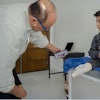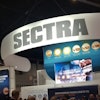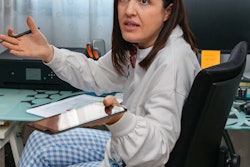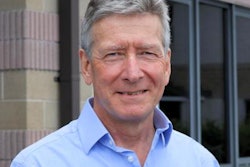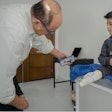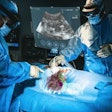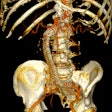
Working from home -- or WFH, as we've learned to call it -- is all the rage. Nothing new about it, of course, but it seems that its time may have come. Apparently, the innumerable objections traditionally raised by IT departments and information governance monitors can be overcome after all.
Distraction-free working in a controlled environment (if that's what you have at home) is certainly an appealing prospect for some people. WFH is of course a double-edged sword. Every radiologist enabled to work remotely, freed from distraction or interruption and possibly more productive as a result, means one less radiologist on the shop floor supporting the radiographers, advising clinical colleagues, and carrying out "hands-on" radiology such as ultrasound and intervention. So there has to be a balance, but with the dire shortage of radiologists in parts of Europe, particularly the U.K., anything that allows people to work who would not otherwise be able to do so has to be a good thing.
 Dr. Giles Maskell.
Dr. Giles Maskell.I have heard of moves afoot to provide home workstations for trainee radiologists. I can only assume that the quality of their accommodation is considerably better than my own at that phase of my working life, when even a regular supply of electricity couldn't be taken for granted. I'm all for making life as easy as possible, but I do have a significant concern about the wisdom of giving the impression to people in the early stages of their careers that radiology is a discipline to be conducted on one's own in a dark room.
I really like the 20-something radiologists with whom I work on a daily basis -- I am referring, by the way, to the number of them rather than their ages! But I have reached the point where I would very much like to see some other people. And not just through the usually unflattering medium of a Zoom call or Teams meeting. I would just love to talk things over with some other radiologists. How's it been for you? What's been happening in your department? How are you coping and what are the best things to come out of this crisis?
I've said it before and doubtless will again: After many years of observing radiological practice, I am more than ever convinced that good quality radiology is best provided as a social (and sociable) enterprise involving frequent interactions with colleagues to request second opinions, discuss interesting cases, provide feedback, and so on. Yes, much of that can still be done without face-to-face interaction, but only really if strong relationships have already been established through personal contact. So for now I plan to carry on turning up to work for the pleasure of working alongside my colleagues.
I do miss a good conference
Which brings me to the subject of virtual congresses ...
With all respect to those radiologists who prepare and deliver amazing online teaching and learning resources, I really appreciate your work and I may learn as much or more from your sessions, but I still hanker after a good conference.
Of course, there are downsides. The travel is rarely enjoyable and the hotels are a mixed bag. But the chance to catch up with old friends, former colleagues, and trainees (exactly who was that I just said hello to?) is priceless. And without a "proper" conference, it's just not going to happen.
There is currently much head-scratching about all this among those who have found themselves in charge of our professional societies at this strangest of times. What exactly is the future of radiology conferences? Should we expect to get back to "normal" at some point in the future? Or should we embrace the changes that COVID-19 has forced on us and expect to do things differently?
You may find this suggestion controversial, but my own view is that we should take advantage of our new willingness to embrace online learning and let our conferences change accordingly. Anyone who has been responsible for organizing meetings in the U.K. in the last few years will know that the drive has been to maximize the number of Continuing Professional Development points (roughly equivalent to hours of formal teaching) at the expense of almost everything else. This has resulted in longer sessions, shorter breaks, and generally reduced opportunities for the networking that is probably the reason most of us attend.
Now that we are getting used to keeping up-to-date through various forms of distance learning out of necessity, perhaps there is an opportunity to reduce the formal teaching elements of conferences and maximize the opportunities for informal exchange that many of us value so highly. Take this to its logical (or possibly absurd) conclusion and the conference could become almost entirely a social event with limited formal educational opportunities attached. Which incidentally is how most successful radiology meetings started in the first place. Plus ça change ...
In the meantime, I will continue to dream about the return of face-to-face congresses.
Dr. Giles Maskell is a consultant radiologist at Royal Cornwall Hospitals National Health Service (NHS) Trust, Truro, U.K. He is a former president of the U.K. Royal College of Radiologists. Competing interests: None declared.
The comments and observations expressed herein do not necessarily reflect the opinions of AuntMinnieEurope.com, nor should they be construed as an endorsement or admonishment of any particular vendor, analyst, industry consultant, or consulting group.
